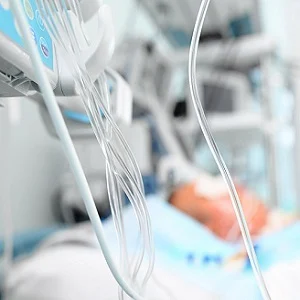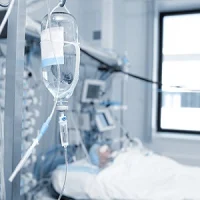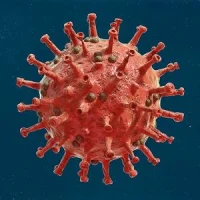Approximately 2.5% of adults acutely admitted to an ICU develop upper gastrointestinal bleeding. 70% of these patients are prescribed stress ulcer prophylaxis. Proton pump inhibitors are the most commonly prescribed drugs as they reduce bleeding risk. However, there are some clinicians who prescribe histamine-2 receptor blockers. But this practice generally depends on clinician preference or hospital policy. Several randomized clinical trials have shown that proton pump inhibitors might be more effective than histamine-2 receptor blockers in preventing upper gastrointestinal bleeding. But the validity of this conclusion remains unclear due to the lack of available data, limitations of these clinical trials and possible bias.
While proton pump inhibitors continue to be prescribed extensively for this problem, they have been known to increase the risk of nosocomial pneumonia and Clostridioides difficile infection. They also have immunosuppressive effects that could potentially increase the risk of death from commonly occurring infection-related complications among patients in the ICU.
The Proton Pump Inhibitors vs. Histamine-2 Receptor Blockers for Ulcer Prophylaxis Treatment in the Intensive Care Unit (PEPTIC) trial was conducted to compare proton pump inhibitors and histamine-2 receptor blockers for stress ulcer prophylaxis among adults in the ICU requiring invasive mechanical ventilation. The goal of the study was to compare the risk of all-cause mortality during hospitalisation up to 90 days.
Participating ICUs used one approach for a 6-month treatment period and then switched to the second treatment approach for the next six months. The primary outcome of the study was in-hospital mortality, while secondary outcomes included upper gastrointestinal bleeding, Clostridioides difficile infection, and ICU and hospital length of stay. A total of 26,828 patients from ICUs in Australia, Canada, England, Ireland, and New Zealand were enrolled in the study. 13436 patients received proton pump inhibitors while 13392 patients received histamine-2 receptor blockers.
Findings from the study show that 18.3% of patients in the proton pump inhibitor group died at the hospital by day 90 compared to 17.5% patients in the histamine-2 receptor blocker group. Upper gastrointestinal bleeding was reported in 1.3% of patients in the proton pump inhibitor group compared to 1.8% in the histamine-2 receptor blocker group. New-onset Clostridioides difficile infection diagnosed in the ICU was reported for 0.30% patients in the proton pump inhibitor group compared to 0.43% in the histamine-2 receptor blocker group.
Overall, these findings show that there was no statistically significant difference in the all-cause mortality within 90 days for ICU patients requiring mechanical ventilation when proton pump inhibitors were used compared to when histamine 2-receptor blockers were used. Fewer patients in the proton pump inhibitor group had clinically important gastrointestinal bleeding compared to the histamine-2 receptor blockers group. Clostridioides difficile infection was rarely reported in this trial. The only statistically significant interaction was related to illness severity. Patients with high illness severity who received proton pump inhibitors had an increased risk of in-hospital mortality compared to those who received histamine-2 receptor blockers. ICU and hospital length of stay were not significantly different by treatment group and neither was the duration of mechanical ventilation and ventilator-associated conditions.
Source: JAMA
Image Credit: iStock
References:
Effect of Stress Ulcer Prophylaxis With Proton Pump Inhibitors vs Histamine-2 Receptor Blockers on In-Hospital Mortality Among ICU Patients Receiving Invasive Mechanical Ventilation. The PEPTIC Randomized Clinical Trial. (2020) The PEPTIC Investigators for the Australian and New Zealand Intensive Care Society Clinical Trials Group, Alberta Health Services Critical Care Strategic Clinical Network, and the Irish Critical Care Trials Group. JAMA. doi:10.1001/jama.2019.22190
Latest Articles
mechanical ventilation, ICU, proton pump inhibitors, stress ulcer, histamine-2 receptor blockers
A new trial compares proton pump inhibitors and histamine-2 receptor blockers for the prevention of stress ulcers among adult patients in ICUs who need mechanical ventilation.










